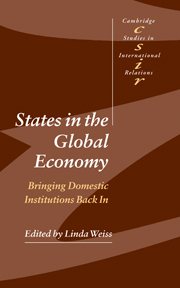Book contents
- Frontmatter
- Contents
- List of figures
- List of tables
- List of contributors
- Preface
- 1 Introduction: bringing domestic institutions back in
- Part I The resilience of welfare states
- 2 Disappearing taxes or the ‘race to the middle’? Fiscal policy in the OECD
- 3 Withering welfare? Globalisation, political economic institutions, and contemporary welfare states
- 4 Globalisation and social security expansion in East Asia
- Part II New economic challenges, changing state capacities
- Part III Governing globalisation
- List of references
- Index
- CAMBRIDGE STUDIES IN INTERNATIONAL RELATIONS
4 - Globalisation and social security expansion in East Asia
Published online by Cambridge University Press: 22 September 2009
- Frontmatter
- Contents
- List of figures
- List of tables
- List of contributors
- Preface
- 1 Introduction: bringing domestic institutions back in
- Part I The resilience of welfare states
- 2 Disappearing taxes or the ‘race to the middle’? Fiscal policy in the OECD
- 3 Withering welfare? Globalisation, political economic institutions, and contemporary welfare states
- 4 Globalisation and social security expansion in East Asia
- Part II New economic challenges, changing state capacities
- Part III Governing globalisation
- List of references
- Index
- CAMBRIDGE STUDIES IN INTERNATIONAL RELATIONS
Summary
Contrary to what is explicitly or implicitly suggested by much of the literature on globalisation, some newly industrialising economies (NICs) in Asia have recently expanded their social security systems in significant ways. First it was Korea that established a comprehensive health insurance scheme followed by a generous pension scheme. Not far behind was Taiwan, which also started with health insurance and is now in the throes of establishing a national pension plan. Singapore offers a contrasting example: it has not established any new social security programme involving significant additional public expenditure since the 1960s. Since the constraints of global competition faced by the three states have been similar, there is a strong prima facie case that it is the domestic factors that explain their different approaches to social security. This chapter is an exploration of the thesis that domestic factors continue to be salient determinants of policy choices and that globalisation merely establishes the outer parameters within which states operate.
This chapter is about how Korea and Taiwan have expanded statutory social security –, defined here to include income maintenance and health – in the last fifteen years or so while Singapore continues to avoid it. I will begin by briefly reviewing the globalisation literature pertinent to social welfare and indicating what it suggests for social policy development in East Asia. I will then briefly discuss the globalisation of the three economies and outline their social security programmes.
- Type
- Chapter
- Information
- States in the Global EconomyBringing Domestic Institutions Back In, pp. 83 - 98Publisher: Cambridge University PressPrint publication year: 2003
- 24
- Cited by



